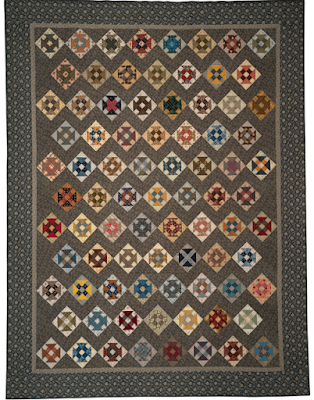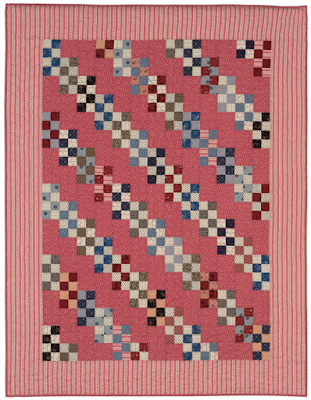Daredevils #5: Pancho's Garden
Scroll down to see the two-page pattern for a 15" finished block.
Friendship Garden by Dorrie Emmer....
It looks like she followed the OFFICIAL pattern.
Becky Brown's block altered a bit.
Scroll down to see what her real block looks like.
Denniele Bohannon's block with future appliqued circles
drawn in.
BlockBase #3597
Another Laura Wheeler pattern, Friendship Garden, was the inspiration for the Daredevil series of blocks. I took that basic structure and adapted it to other blocks in EQ8.
Many quiltmakers took on the challenge in the 1930-1970 years.
Here’s one with a lavender dot—-maybe from the 1940s-’50s.
The Block
Daredevils pattern for a 15" block.
Cut paper templates. Add seams to the fabric.
Below the center template D.
How to Print
Create a word file or a new empty JPG file that is 8-1/2" x 11".
Click on the image above.
Right click on it and save it to your file.
Print that file out 8-1/2" x 11". The small square should measure 1"
Adjust the printed page size if necessary.
Pancho Barnes
Our spokesmodel
See more about Florence Lowe Barnes here:
Becky Brown's actual block
She added seams to that empty center, which is now a four patch.
Typical OCS newspaper clipping, this one from the Pottstown Mercury
I didn't realize this Quilt Along was going to be a Laura Wheeler fest.
The designers were clever and the company was quite prolific.
They definitely suggested some daredevil piecing. As Teddy P said in a block identification discussion:
"If it’s a nightmare to piece you can suspect Laura Wheeler. I often think that designer just drew segments that looked interesting but she had no clue how the sewing was done."
Georgia Broadwick preparing to parachute.
Notice ballet slippers
Our Facebook Group: DaredevilsQuiltAlong.
Ask to join whether you are sewing along or standing on the ground watching.



























































